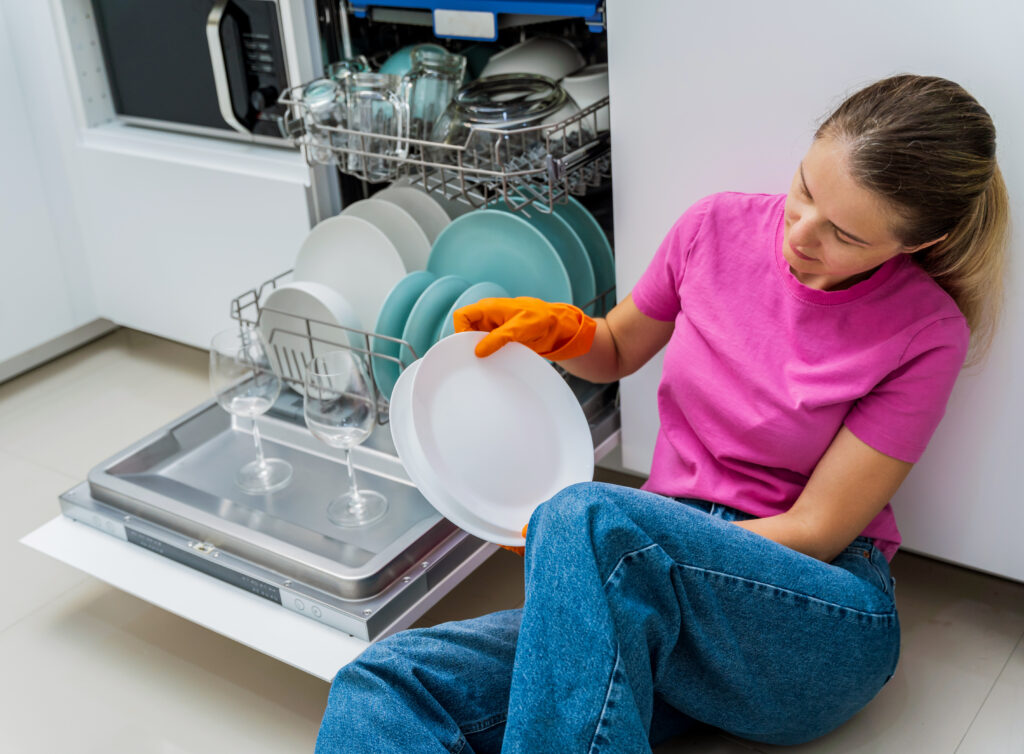Maintaining a clean and odor-free dishwasher is essential in keeping your kitchen environment pleasant, as well as ensuring the optimal performance of your appliance. Though dishwashers are designed to clean your dishes, they still require regular cleaning themselves, as build-up and debris can accumulate over time, potentially leading to unpleasant odors. In this article, we’ll guide you through the process of cleaning your dishwasher and preventing future odors, allowing you to enjoy a fresh and sanitary kitchen.
To clean your dishwasher effectively, there are certain steps and methods that should be followed to ensure a thorough and comprehensive cleaning. This includes addressing both the interior components, such as the filter and spray arms, as well as the exterior surfaces that may be prone to staining or grime build-up. By giving attention to these key aspects of your dishwasher, you can ensure that your appliance remains in top working condition while also preventing malodors from lingering in your kitchen space.
In order to prevent odors from developing in your dishwasher, it’s important to establish a regular cleaning routine and carry out preventive measures. Some tips include rinsing dishes before they go into the dishwasher, avoiding overloading the machine, and promptly attending to any leftover food debris or residue. By adopting these practices, you can keep your dishwasher clean and smelling fresh, while also extending its lifespan and enhancing its overall performance.
Cleaning the Dishwasher
Dealing with Buildup and Residues
To effectively clean a dishwasher, start by addressing the buildup and residues inside. First, remove all dishes and utensils. Next, do the following:
- Vinegar and hot water solution: Fill a container (such as a dishwasher-safe cup) with distilled white vinegar and place it on the top rack of the dishwasher. Run a full cycle on the hottest water setting. The vinegar helps dissolve grease, grime, and food particles, leaving the interior sparkling clean.
- Baking soda treatment: After completing the vinegar cycle, sprinkle a layer of baking soda on the bottom of the dishwasher. Run a short cycle on the hottest water setting. This will eliminate any remaining odors and provide extra cleaning power.
Cleaning Specific Dishwasher Parts
It’s essential to clean individual parts of the dishwasher to ensure it functions optimally and prevents odors. Here are the key areas to focus on:
- Filter: Use a sponge or soft brush to gently scrub the filter with a mixture of hot water and mild soap. Rinse it thoroughly and replace it in the dishwasher. Be sure to do this regularly to avoid buildup.
- Spray arms: Use a toothpick or small brush to clear any food debris and soap scum from the spray arm holes. Rinse them under running water to ensure they’re free from any residue.
- Racks: Remove the racks and wash them with hot, soapy water. Use a bottle brush for hard-to-reach areas. Dry them thoroughly before reinstalling them in the dishwasher.
- Seals and door gasket: Use a sponge soaked in hot, soapy water to gently clean the rubber seals and door gasket. Pay extra attention to areas where dirt and food particles may accumulate. Rinse and dry the seals afterward.
- Cleaning the drain filter: Remove the bottom rack and locate the drain filter. Take out the filter and rinse it under hot water, using a soft brush to remove any food particles or debris. Replace the filter, ensuring it’s properly seated.
In addition to these steps, using a commercial dishwasher cleaner periodically can help maintain your appliance’s cleanliness and performance. Maintaining a clean dishwasher will not only prevent unpleasant odors but also prolong its lifespan and ensure it continues to clean your dishes effectively.
Preventing Odors and Maintaining Freshness
Routine Practices for Odor Prevention
To keep your dishwasher smelling fresh and prevent foul odors, it’s essential to practice regular cleaning. Start by removing any trapped food particles and food waste from the utensil holder, door lip, and gasket seal. Clean these areas with a soapy sponge or cloth, using a mild dish soap.
It’s also important to check the drain hose and sprayer arm ports for any blockages. Clearing these areas will help prevent mildew growth and unpleasant odors. Fill a dishwasher-safe bowl with one cup of vinegar and place it on the bottom rack. Run your dishwasher on a hot-water cycle to remove lingering bacteria, mold, and mineral deposits caused by hard water.
Another effective method for odor prevention is using essential oils, such as lemon or lavender, which offer a non-toxic and pleasant fragrance. Add a few drops onto a dishwasher-safe container and place it on the top rack. Run the dishwasher on a normal cycle to disperse the aroma throughout the appliance.
Troubleshooting Common Issues
If you’re still experiencing a smelly dishwasher after regular cleaning, it might be time to troubleshoot some common problems. Here’s a list of potential issues and possible solutions:
| Problem | Solution |
|---|---|
| Mildew growth | Use household cleaners with chlorine to target and eliminate mildew. However, avoid using corrosive acids that may damage your appliance. |
| Clogged drain | Inspect the drain hose, filter, and drain itself for any debris or food residue obstructing water flow and remove any blockages. |
| Hard water | If your dishwasher has persistent mineral deposits from hard water, consider using a water softening agent or a dishwasher cleaner specifically designed for hard water buildup. |
Implementing these routine practices and troubleshooting common issues will help maintain your dishwasher’s cleanliness, prevent odors, and ensure a fresh-smelling appliance.

